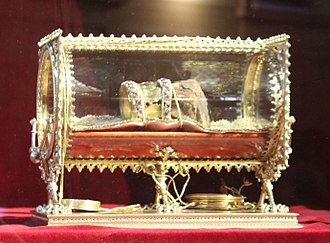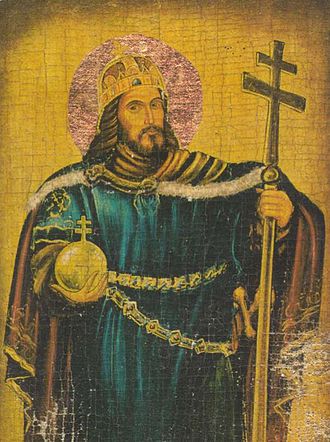Hungary is much in the news of late, with current leader Viktor Orban standing against the tsunami of insanity washing over the rest of Europe, threatening to deluge civilization – Western or Eastern – as we know it. As may be expected in this inverted world, he is vilified for doing so. This may seem ironic, for Hungary was for the first millennium of the Christian era an almost entirely pagan nation – with ‘Hun’ being a synonym for all that ‘paganism’ means – until the rise of her first and greatest king, Stephen, Greek for ‘crown’, or the ‘crowned one’, who was born around the year 975 as Vajk, ‘hero, prince or master’. So, by nomenclature, he seemed born for the role.
His monarchy dates from the propitious year 1000, and he reigned until his death on the also-propitious solemnity of the Assumption, August 15th, 1038. Whatever else one says of King Stephen, he was a not a milquetoast millennial, and did not believe that ‘diversity is our strength’, unless that diversity had a deeper, binding unity in the Catholic Faith, which he instantiated in his kingdom through the laws of the land, extirpating superstitious, pagan beliefs and customs. His first war was against his own brother and a pagan army.
After all, how does a nation maintain itself, without a common belief in marriage and family life, in common worship, holy days and feast days, in a shared basis in morality, the right to life and legitimate freedom, and in some transcendent truth that binds it all together? Polygamy, divorce, indolence, contraception, base coinage, inflation, pornography, erroneous views of marriage, the child sacrifice of abortion, all these evils undermine and ultimately corrupt any society. (We need not elaborate on the state of Canada). Here is the opening of King Stephen’s letter to his son, preparing him for succession:
My dearest son, if you desire to honour the royal crown, I advise, I counsel, I urge you above all things to maintain the Catholic and apostolic faith with such diligence and care that you may be an example for all those placed under you by God and that all the clergy may rightly call you a man of true Christian profession. Failing to do this, you may be sure that you will not be called a Christian or a son of the Church. Indeed, in the royal palace – after the faith itself – the Church holds second place, first propagated as she was by our head, Christ; then transplanted, firmly constituted and spread through the whole world by his members, the apostles and holy fathers. And though she always produced fresh offspring, nevertheless in certain places she is regarded as ancient.
King Stephen realized that his kingdom had to be Christian, or it would dissolve into chaos and various factions vying for power, and their own proclivities, by violence.
Not only must the state adhere to the teachings of Christ, but so must the rulers themselves:
With his own holiness and vigour, Stephen held Hungary together as a Catholic nation, setting up dioceses, bishoprics, building cathedrals and churches, collecting relics, enforcing laws, such that Hungary became prosperous and flourishing, and the safest route through to the East and the Holy Land. Stephen’s currency was solid, and popular throughout Europe, and his reign, overall, a glorious one. Sadly, King Stephen outlived all his children, and after his death Hungary fell into civil war, until the accession of his grandson, Ladislaus, in 1077. To this day, the feast of King Saint Stephen – celebrated in Hungary on August 20th – is a national holiday, ‘State Foundation Day’. And rejoice they should. Stephen’s right hand – a symbol of his kingly power – is displayed in the basilica named after him in Budapest (curiously, with its own feast day of the ‘Holy Dexter’ on May 30th). He was canonized in 1083 by Pope Gregory VII, the great pontiff of Church reform.

May that reform of both Church and state continue, guided by the fullness of God’s revealed truth, under the intercession of Saint Stephen.
Ora pro nobis! +
(partial source: wikipedia.org)

